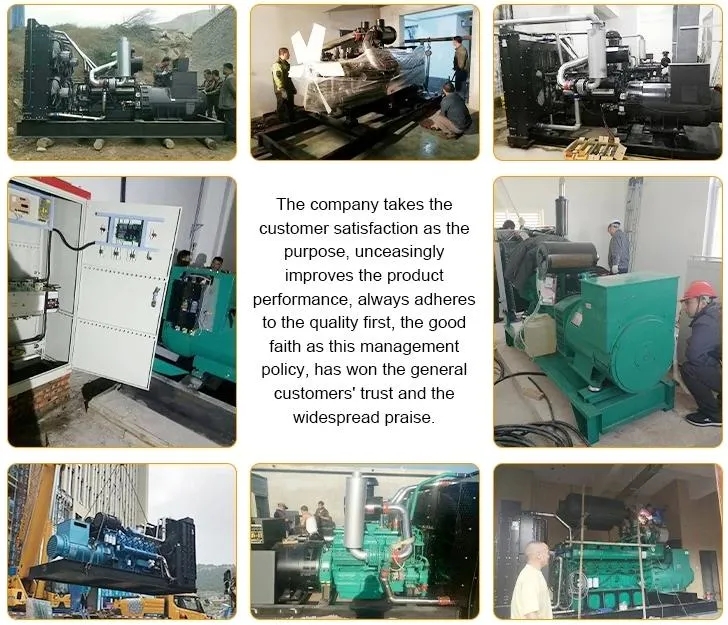Diesel Generators for Marine Use Powering Ships at Sea

Introduction
Diesel generators play a crucial role in powering various marine vessels, ranging from small boats to large ships. These generators provide the necessary electrical energy for propulsion, lighting, communication systems, refrigeration, and other onboard equipment. In this article, we will explore the importance of diesel generators for marine use, their working principle, key components, maintenance requirements, and advancements in technology.
Importance of Diesel Generators for Marine Use
Diesel generators are preferred for marine applications due to their reliability, durability, and efficiency. Unlike gasoline engines, diesel engines are more fuel-efficient and can provide higher torque at lower speeds, making them ideal for marine propulsion systems. In addition, diesel fuel is less volatile than gasoline, reducing the risk of fire hazards onboard ships.
Marine vessels rely on diesel generators to meet their power requirements while at sea. These generators can provide electricity for essential systems such as navigation equipment, communication devices, and pumps. In case of an emergency, diesel generators can also act as backup power sources to ensure the safety and operation of the vessel.

Working Principle of Diesel Generators
Diesel generators operate based on the principles of the diesel cycle, which involves the compression of air, injection of fuel, combustion, and expansion of gases to produce mechanical energy. The key components of a diesel generator include the engine, alternator, fuel system, cooling system, and control panel.
The engine is the heart of the diesel generator and is responsible for converting the chemical energy of diesel fuel into mechanical energy. The engine consists of cylinders, pistons, valves, and a crankshaft, which work together to combust the fuel-air mixture and generate power.
The alternator, also known as the generator, is connected to the engine and converts the mechanical energy into electrical energy through the process of electromagnetic induction. The alternator produces alternating current (AC), which is then converted into direct current (DC) using a rectifier for onboard use.
The fuel system of a diesel generator comprises the fuel tank, fuel pump, fuel injectors, and filters. The fuel pump delivers diesel fuel from the tank to the injectors, where it is sprayed into the combustion chamber for ignition. Filters are used to remove impurities and ensure the smooth operation of the engine.
The cooling system of a diesel generator helps regulate the temperature of the engine to prevent overheating. It typically consists of a radiator, water pump, thermostat, and coolant, which circulates through the engine to dissipate excess heat and maintain optimal operating conditions.
The control panel of a diesel generator is equipped with sensors, gauges, switches, and a microprocessor that monitor and regulate the generator's operation. The control panel allows users to start, stop, and adjust the generator's settings, as well as provides real-time information on performance and diagnostics.
Maintenance Requirements for Diesel Generators
Proper maintenance is essential to ensure the reliable operation and longevity of diesel generators onboard marine vessels. Regular maintenance tasks include the following:
1. Fuel System Maintenance: Regularly inspect and clean the fuel tank, filters, and injectors to prevent fuel contamination and ensure proper fuel delivery to the engine.
2. Cooling System Maintenance: Check coolant levels, inspect hoses and connections for leaks, and clean the radiator to prevent overheating and maintain efficient cooling.
3. Engine Maintenance: Change the engine oil and filters at recommended intervals, inspect belts and hoses for wear, and adjust engine timing and valve clearance as needed.
4. Electrical System Maintenance: Test and replace batteries, inspect wiring and connections for corrosion, and clean the alternator and rectifier to ensure reliable electrical output.
5. Control Panel Maintenance: Test and calibrate sensors, gauges, and switches, update software as needed, and keep the control panel clean and free of debris for proper operation.
6. Regular Testing and Monitoring: Conduct routine load bank testing to verify the generator's capacity and performance under full load conditions. Monitor fuel consumption, temperature, and other parameters to detect any issues early on.
Advancements in Technology
Advancements in technology have led to the development of more efficient and environmentally friendly diesel generators for marine use. Some of the key advancements include:
1. Hybrid Systems: Hybrid diesel-electric propulsion systems combine diesel generators with batteries or fuel cells to improve fuel efficiency and reduce emissions. These systems allow vessels to operate on battery power alone at low speeds, reducing fuel consumption and noise levels.
2. Variable Speed Generators: Variable speed diesel generators adjust the engine speed based on the power demand, resulting in higher efficiency and reduced fuel consumption. These generators can also operate at lower noise levels and produce less vibration compared to fixed-speed generators.
3. Electronic Control Systems: Advanced electronic control systems use microprocessors and sensors to optimize the performance of diesel generators. These systems can adjust fuel injection timing, air-fuel mixture, and other parameters in real-time to maximize efficiency and reduce emissions.
4. Exhaust Aftertreatment Systems: Exhaust aftertreatment systems, such as selective catalytic reduction (SCR) and diesel particulate filters (DPF), are used to reduce harmful emissions from diesel generators. These systems help comply with stringent environmental regulations and improve air quality.
75kw diesel generator for remote locations are indispensable for powering marine vessels and ensuring the safety and efficiency of operations at sea. These generators provide reliable electrical energy for propulsion, equipment, and systems onboard ships, making them essential components of the maritime industry. By understanding the working principle, maintenance requirements, and advancements in technology of diesel generators, shipowners and operators can make informed decisions to enhance the performance and sustainability of their vessels.
